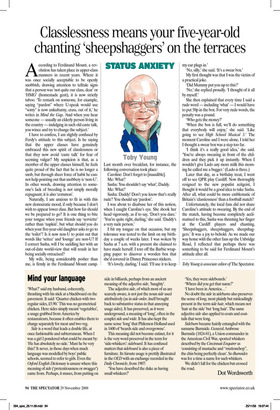Classlessness means your five-year-old chanting ‘sheepshaggers’ on the terraces
According to Ferdinand Mount, a revolution has taken place in upper-class manners in recent years. Where it was once socially acceptable to be openly snobbish, drawing attention to telltale signs that a person was ‘not quite our class, dear’ or ‘HMG’ (homemade gent), it is now strictly taboo. ‘To remark on someone, for example, saying “pardon” where U-speak would use “sorry” is now unkulturny, crass, out of it,’ he writes in Mind the Gap. ‘And when you hear someone — usually an elderly person living in the country — indulging in such old caste talk, you wince and try to change the subject.’ I have to confess, I am slightly confused by Ferdy’s attitude to this subject. Is he saying that the upper classes have genuinely embraced this new spirit of classlessness or that they now avoid ‘caste talk’ for fear of seeming vulgar? My suspicion is that, as a member of the upper classes himself, he feels quite proud of the fact that he is no longer a snob, but through sheer force of habit he cannot help pointing out that snobbery is ‘non-U’. In other words, drawing attention to someone’s lack of breeding is not simply morally repugnant; it is also ‘common’.
Naturally, I am anxious to fit in with this new democratic mood, if only because I don’t wish to appear lower class. But how far should we be prepared to go? It is one thing to bite your tongue when your friends say ‘serviette’ rather than ‘napkin’, but what should you do when your five-year-old daughter asks to go to the ‘toilet’? Is it now non-U to point out that words like ‘settee’ and ‘lounge’ are non-U? If I correct Sasha, will I be saddling her with an out-of-date world-view that will result in her being socially ostracised?
My wife, being considerably posher than me, is firmly in the Ferdinand Mount camp. Last month over breakfast, for instance, the following conversation took place: Caroline: Don’t forget to [inaudible].
Me: What?
Sasha: You shouldn’t say ‘what’, Daddy.
Me: What?
Sasha: Daddy! Don’t you know that’s really rude? You should say ‘pardon’.
I was about to disabuse her of this notion, when I caught Caroline’s eye. She shook her head vigorously, as if to say, ‘Don’t you dare.’ ‘You’re quite right, darling,’ she said. ‘Daddy’s a very rude person.’ I bit my tongue on that occasion, but my tolerance was tested to the limit on my birthday a couple of weeks later. I was woken by Sasha at 7 a.m. with a present she claimed to have made herself. I tore off the Barbie wrapping paper to discover a wooden box that she’d covered in Disney Princesses stickers.
‘It’s lovely, darling,’ I said. ‘I’ll use it to keep my ear plugs in.’ ‘No, silly,’ she said. ‘It’s a swear box.’ My first thought was that I was the victim of a practical joke.
‘Did Mummy put you up to this?’ ‘No,’ she replied proudly. ‘I thought of it all by myself.’ She then explained that every time I said a rude word — including ‘what’ — I would have to put 50p in the box. For very rude words, the penalty was a pound.
‘Who gets the money?’ ‘When the box is full, we’ll do something that everybody will enjoy,’ she said. ‘Like going to see High School Musical 3.’ The moment Caroline and I were alone, I told her I thought a swear box was a step too far.
‘I think it’s a really good idea,’ she said. ‘You’re always swearing in front of the children and they pick it up instantly. When I wouldn’t give Ludo any more milk this morning he called me a bugger.’ (Ludo is three.) Later that day, as a birthday treat, I went off to see QPR play Cardiff. Now thoroughly resigned to the new populist zeitgeist, I thought it would be a good idea to take Sasha. After all, what could be more emblematic of Britain’s ‘classlessness’ than a football match?
Unfortunately, the local fans did not share Caroline’s attitude to swearing. By the end of the match, having become completely acclimatised to this, Sasha was thrusting her finger at the Cardiff players and chanting, ‘Sheepshaggers, sheepshaggers, sheepshaggers.’ It was a joy to behold. As we made our way home with the other fans up the Uxbridge Road, I reflected that perhaps there was something to be said for Ferdinand Mount’s attitude after all.
Toby Young is associate editor of The Spectator.


































































































 Previous page
Previous page